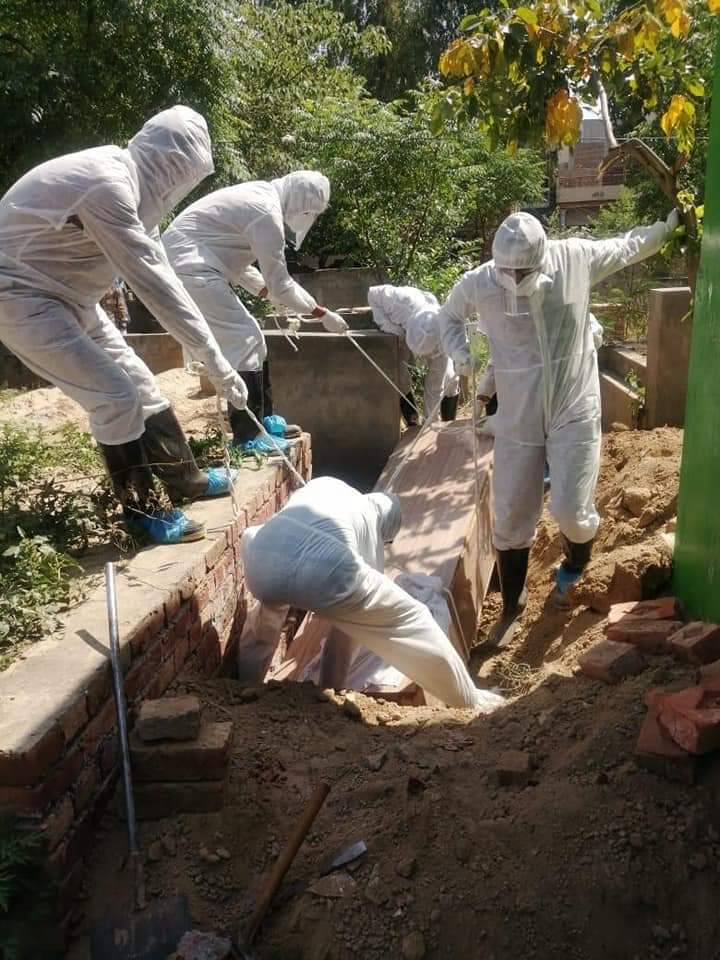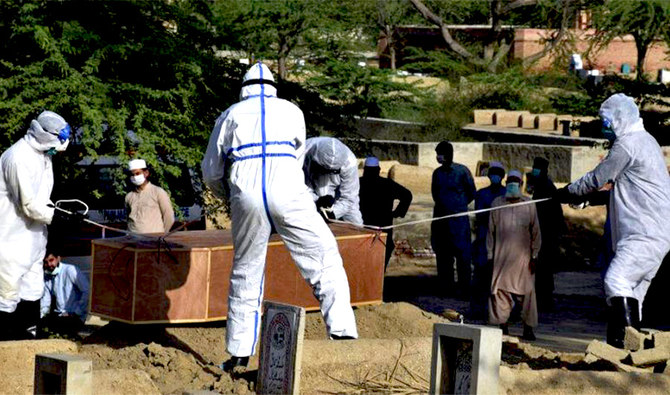LAHORE: Dr. Hafiz Sanaullah had only known his patient for a week. Yet, the two formed a strong bond. On most evenings, in an isolation ward for coronavirus patients in Pakistan’s northern Shangla district, the two men would sit together and talk for hours.
Muhammad Zar, a professional cook, would shares stories of his childhood, his home, and, if he was in the mood, his favorite recipes. The young doctor would regale the father of five with details of his day. Sometimes, Dr. Sanaullah would bring home-cooked meals for his patient to critique.
“That is how we would pass time,” the doctor told Arab News, over the phone, “It was a short, but a lovely relationship.”
On April 7, Zar succumbed to the deadly disease. At 5 a.m., when the doctor arrived at the hospital, Zar’s lifeless body lay in front of him.
At that point, Dr. Sanaullah knew that he would have to go above and beyond for his 65-year-old patient in the absence of Zar’s family, who were confined to their homes since the day he tested positive.

A burial of a Covid-19 victim in Lahore by Rescue 1122 officials. (Photo by Shahid Waheed)
“It was my duty to give my friend a proper and dignified funeral,” he said. “Despite the risk.”
In the next hour, the physician washed the body and carefully wrapped it in a plastic bag, following the World Health Organization’s guidelines on burials for Covid-19 victims.
Only a handful of men who worked at the hospital were in attendance as the doctor offered funeral prayers.
The body was then taken to Zar’s village for a second funeral, where health officials warned people on the loud speaker against crowding the streets or coming near the body bag.
Zar’s 21-year-old son Nazeer Ahmed stood at a distance and watched. He could not touch or kiss his father for the last time.
“My sisters didn’t even attend the funeral because the whole area had been cordoned off,” Ahmed told Arab News. “We barely got to see his face. What will we tell our father when we meet him on the day of judgment?”
After the burial, district administration officials burned down everything Zar had touched, including his walking stick, wallet, blanket and even his identity card.
“We have nothing left of him,” Ahmed said, his voice choking on the phone, “This is such a cruel disease.”
Since the coronavirus pandemic in Pakistan, funeral rituals and traditions have quickly and dramatically changed.
As per Pakistan’s National Institute of Health guidelines, only trained personnel can handle the remains of a confirmed case. When preparing for a burial, the body should be placed in a plastic bag and those handling the body should be wearing personal protection equipment (PPE), including disposable gloves, overalls, face mask and a plastic apron.
All belongings of the patient should either be disinfected or burned.

A burial of a Covid-19 victim in Lahore by Rescue 1122 officials. (Photo by Shahid Waheed)
The World Health Organization, in its March 24 guidance, further advises that the family may view the body but not touch or kiss it. The organization adds that while there is still no evidence of persons having become infected from exposure to the bodies of persons who died from COVID-19, it is still necessary to take precautionary measure to prevent the virus from spreading.
In Pakistan, traditionally, relatives wash the body of the deceased and prepare it for a funeral. Communal prayers are held and in the next three days, there is outpouring of grief as people throng in to offer condolences.
But since the outbreak, funeral processions and congregations are not allowed. Burials are held in simple silence, as strangers carry out the final rituals while loved ones watch from afar.
In Punjab, the undertaker for claimed and unclaimed bodies is the state-run Rescue 1122, an emergency service. To date, it has buried 172 suspected coronavirus victims in the province.
“We say suspected because while some were confirmed positive, others tests were pending when we lay them to rest,” Farooq Ahmed, the public relations officer for Rescue 1122 Punjab, told Arab News.
Since February, the service has dedicated a fleet of ambulances and reserved a chunk of its staff for coronavirus-related activities.
One of its officers personally overlooking the burials of Covid-19 victims is Shahid Waheed, a district officer in Lahore. Waheed did not know any of the 40 suspected patients whose dead bodies he carried to the cemetery in the last two months. But for the 40-year-old, there was no greater honor.
“To shoulder someone’s coffin, to help someone as they grieve, I think I am blessed to be able to do this work,” he told Arab News over the phone.
As per standard operating procedures in the province, only four close relatives are allowed to accompany the dead body, Waheed explained, and that too in proper hazmat suits. Even then, no one is allowed to touch the body, or go near it.
Waheed agreed that for family members, to watch unfamiliar faces like his own bury a loved one can be very difficult. But, the rescue official added, he has been in the service for over a decade and seen worse.
“I have collected the remains of bodies blown to pieces in a bomb blast,” he said, “I’ve picked up those pieces, put them in a bag and buried them on my own. I don’t know what is more cruel, this virus or that. But I guess that is just how life is.”
















